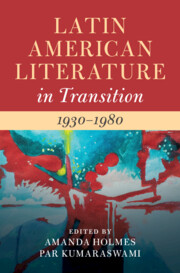Book contents
- Latin American Literature in Transition 1930–1980
- Latin American Literature in Transition
- Latin American Literature in Transition 1930–1980
- Copyright page
- Contents
- Contributors
- Introduction
- Part I War, Revolution, Dictatorship
- Part II Metropolis and Ruins
- Part III Solidarity
- Part IV Aesthetics and Innovation
- Index
Chapter 19 - Cortázar’s Transitional Poetics: Experiments in Verse behind Experiments in Prose
from Part IV - Aesthetics and Innovation
Published online by Cambridge University Press: 24 January 2023
- Latin American Literature in Transition 1930–1980
- Latin American Literature in Transition
- Latin American Literature in Transition 1930–1980
- Copyright page
- Contents
- Contributors
- Introduction
- Part I War, Revolution, Dictatorship
- Part II Metropolis and Ruins
- Part III Solidarity
- Part IV Aesthetics and Innovation
- Index
Summary
While Julio Cortázar is best known as a fiction writer, a full understanding of his oeuvre must take into account his poetry, which has mostly been ignored in the critical literature. Cortázar not only published several volumes of poetry but also included poems in many of his prose works and wrote extensively about poetry. The significance of poetry – that he read as well as wrote – is ever present in Cortázar’s overall literary vision. His poetic work registers his innovative and playful sensibility along with his increasingly politicized engagement. This essay demonstrates through close readings and archival documentation how poetry for Cortázar serves as a transitional mode. Archives of his manuscripts, drafts, unpublished poems, and personal library reveal much about the author’s poetic craft and his shifting stance on the politics of his time. A thorough articulation of Cortázar’s poetic concerns provides a fuller appreciation of the formal and linguistic innovation that undergirds his prose, shapes his ideological and aesthetic evolution, and particularly informs the last phase of his life and work. Poetry serves Cortázar as a bridge between aesthetics and the world around him as his work increasingly puts innovation to the service of sociopolitical engagement.
Keywords
- Type
- Chapter
- Information
- Latin American Literature in Transition 1930–1980 , pp. 306 - 321Publisher: Cambridge University PressPrint publication year: 2022



